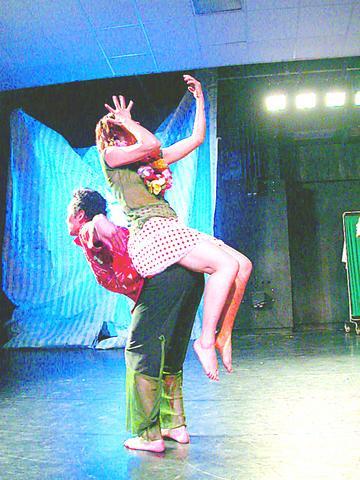What associations do choreographers make when they hear Taiwanese contemporary music? In Morendo, transposed from A minor to E major, (失憶邊境,A小調轉降E大調) choreographer Yao Shu-feng (姚淑芬) presents some answers to this question.
This latest work of Yao's was created at the invitation of the CKS Cultural Center, which has held the regular contemporary music concerts titled "Tune in to Taiwan: Taiwan Composers Series" (啟動台灣的聲音) to promote the works of contemporary musicians.
Morendo is a dance performance that bring together the work of composers Lien Hsian-sheng(連憲升), Chian Yu-shan (簡郁珊) and Lee Yuan-cheng (李元貞).

PHOTO: VICO LEE, TAIPEI IMES
"Contemporary music has complicated rhythms which offer few cues for dancers to follow. It's very difficult to choreograph pieces that go with this music. When I listen to these musical works, I work through one situation after another. It is the flow of time," said Yao, leader of the Century of Contemporary Dance Company. (世紀當代舞團).
This sense of discontinuation in music, Yao said, is like human memory. "As you think back on your life, what you remember is not a continuity of life, but many scattered scenes from your life," Yao said. "A person relies on his or her memories for the formation [of personality]. If a person has no memory, is he or she still a person?" Yao asks.
Like many of Yao's previous works, a sense of personal alienation as a result of the bustling modern life is evident in most of the episodes of the dance.
If Yao's interpretation of human memory seems on the bleak side, that may only be typical of artists. "All artists seem to remember bad moments. They always remember where they are flawed," Yao said.
Morendo will be performed at the Experimental Theater of the National Theater (國家劇院實驗劇場), 21-1, Chungshan S. Rd, Taipei. (台北巿中山南路21之1號) tonight and tomorrow at 7:30pm. Matinee performances will be held tomorrow and Sunday at 2:30pm. Tickets are NT$350 and available at the CKS Culture Center or by calling (02) 23431647.

On April 26, The Lancet published a letter from two doctors at Taichung-based China Medical University Hospital (CMUH) warning that “Taiwan’s Health Care System is on the Brink of Collapse.” The authors said that “Years of policy inaction and mismanagement of resources have led to the National Health Insurance system operating under unsustainable conditions.” The pushback was immediate. Errors in the paper were quickly identified and publicized, to discredit the authors (the hospital apologized). CNA reported that CMUH said the letter described Taiwan in 2021 as having 62 nurses per 10,000 people, when the correct number was 78 nurses per 10,000

As we live longer, our risk of cognitive impairment is increasing. How can we delay the onset of symptoms? Do we have to give up every indulgence or can small changes make a difference? We asked neurologists for tips on how to keep our brains healthy for life. TAKE CARE OF YOUR HEALTH “All of the sensible things that apply to bodily health apply to brain health,” says Suzanne O’Sullivan, a consultant in neurology at the National Hospital for Neurology and Neurosurgery in London, and the author of The Age of Diagnosis. “When you’re 20, you can get away with absolute

May 5 to May 11 What started out as friction between Taiwanese students at Taichung First High School and a Japanese head cook escalated dramatically over the first two weeks of May 1927. It began on April 30 when the cook’s wife knew that lotus starch used in that night’s dinner had rat feces in it, but failed to inform staff until the meal was already prepared. The students believed that her silence was intentional, and filed a complaint. The school’s Japanese administrators sided with the cook’s family, dismissing the students as troublemakers and clamping down on their freedoms — with

As Donald Trump’s executive order in March led to the shuttering of Voice of America (VOA) — the global broadcaster whose roots date back to the fight against Nazi propaganda — he quickly attracted support from figures not used to aligning themselves with any US administration. Trump had ordered the US Agency for Global Media, the federal agency that funds VOA and other groups promoting independent journalism overseas, to be “eliminated to the maximum extent consistent with applicable law.” The decision suddenly halted programming in 49 languages to more than 425 million people. In Moscow, Margarita Simonyan, the hardline editor-in-chief of the